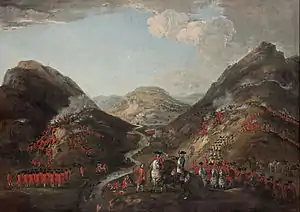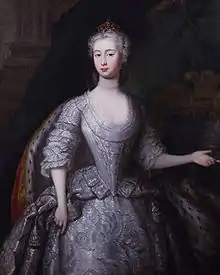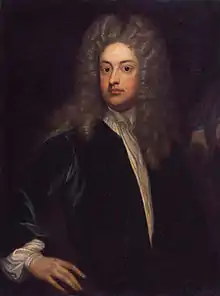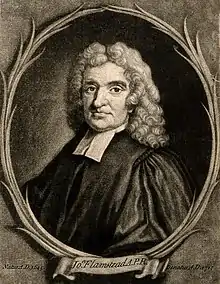1719
1719 (MDCCXIX) was a common year starting on Sunday of the Gregorian calendar and a common year starting on Thursday of the Julian calendar, the 1719th year of the Common Era (CE) and Anno Domini (AD) designations, the 719th year of the 2nd millennium, the 19th year of the 18th century, and the 10th and last year of the 1710s decade. As of the start of 1719, the Gregorian calendar was 11 days ahead of the Julian calendar, which remained in localized use until 1923.
| Millennium: | 2nd millennium |
|---|---|
| Centuries: | |
| Decades: | |
| Years: |
| 1719 by topic |
|---|
| Arts and science |
| Countries |
| Lists of leaders |
| Birth and death categories |
|
| Establishments and disestablishments categories |
|
| Works category |
|
| Gregorian calendar | 1719 MDCCXIX |
| Ab urbe condita | 2472 |
| Armenian calendar | 1168 ԹՎ ՌՃԿԸ |
| Assyrian calendar | 6469 |
| Balinese saka calendar | 1640–1641 |
| Bengali calendar | 1126 |
| Berber calendar | 2669 |
| British Regnal year | 5 Geo. 1 – 6 Geo. 1 |
| Buddhist calendar | 2263 |
| Burmese calendar | 1081 |
| Byzantine calendar | 7227–7228 |
| Chinese calendar | 戊戌年 (Earth Dog) 4415 or 4355 — to — 己亥年 (Earth Pig) 4416 or 4356 |
| Coptic calendar | 1435–1436 |
| Discordian calendar | 2885 |
| Ethiopian calendar | 1711–1712 |
| Hebrew calendar | 5479–5480 |
| Hindu calendars | |
| - Vikram Samvat | 1775–1776 |
| - Shaka Samvat | 1640–1641 |
| - Kali Yuga | 4819–4820 |
| Holocene calendar | 11719 |
| Igbo calendar | 719–720 |
| Iranian calendar | 1097–1098 |
| Islamic calendar | 1131–1132 |
| Japanese calendar | Kyōhō 4 (享保4年) |
| Javanese calendar | 1643–1644 |
| Julian calendar | Gregorian minus 11 days |
| Korean calendar | 4052 |
| Minguo calendar | 193 before ROC 民前193年 |
| Nanakshahi calendar | 251 |
| Thai solar calendar | 2261–2262 |
| Tibetan calendar | 阳土狗年 (male Earth-Dog) 1845 or 1464 or 692 — to — 阴土猪年 (female Earth-Pig) 1846 or 1465 or 693 |
| Wikimedia Commons has media related to 1719. |
Events
January–March
- January 23 – The Principality of Liechtenstein is created, within the Holy Roman Empire.[1]
- February 3 (January 23 Old Style) – The Riksdag of the Estates recognizes Ulrika Eleonora's claim to the Swedish throne, after she has agreed to sign a new Swedish constitution. Thus, she is recognized as queen regnant of Sweden.
- February 20 – The first Treaty of Stockholm is signed.
- February 28 – Farrukhsiyar, the Mughal Emperor of India since 1713, is deposed by the Sayyid brothers, who install Rafi ud-Darajat in his place. In prison, Farrukhsiyar is strangled by assassins on April 19.
- March 17 – The coronation of Ulrika Eleonora as Queen of Sweden takes place in Stockholm
April–June
- April 4 – The French army under James FitzJames, 1st Duke of Berwick invades the Basque provinces of Spain, with 20,000 troops crossing into Navarre. [2]
- April 19 – In Louisiana (New France), Jean-Baptiste Le Moyne, Sieur de Bienville's brother Serigny arrives on a French man-of-war, bringing news that war had been declared between France and Spain (from December 1718).
- April 25 – Daniel Defoe publishes Robinson Crusoe.
- April 26 – King Philip V of Spain departs Madrid and leads 15,000 men of the Spanish Army into Navare to fight the French under Berwick. [3]
- May 14 – In Louisiana (New France), Bienville, from Mobile, captures Pensacola, but Pensacola is later recaptured by the Spanish, and again re-taken by Bienville.[4]
- June 4 – Battle of Ösel Island: A Russian naval force defeats the Swedish fleet.
- June 10 – Battle of Glen Shiel: British forces defeat the Jacobites and their Spanish allies.
- June 20 – Battle of Francavilla: The Austrians are defeated by the Spanish.
July–September
- July 11 – Russia's Baltic Sea fleet is first spotted from the Swedish coast, starting the Russian Pillage of 1719–21 as part of the Great Northern War.
- July 16 – The Carlsten fortress in Sweden surrenders to a Danish and Norwegian force after a siege of seven days. Colonel Henrich Danckwardt, who surrendered the fortress to Peter Tordenskjold after being away from it while it was still defensible, is beheaded on September 16.
- August 13 – In the Battle of Stäket, Crown Prince Frederick I of Sweden leads the successful defense of Stockholm from Russian Admiral Fyodor Apraksin's Baltic Fleet during the Russian Pillage.
- August 20 – Princess Maria Josepha of Austria, at one time the heir presumptive to the throne of Austria's Habsburg Empire, marries Frederick Augustus, Elector of Saxony ten days of renouncing any claim to the Austrian throne.
- September 3 – The three-story tall Opernhaus am Zwinger, one of the largest opera houses in the world at the time, opens in Dresden by staging Antonio Lotti's Giovi in Argo. [5]
- September 18 – James Figg claims the title of bare-knuckle boxing champion of England and defends his title 270 times before retiring in 1730.[6]
- September 29 – owned as the 12th Mughal Emperor of India at Shahjahanabad (now Delhi), 12 days after the death of Shah Jahan II from tuberculosis. [7]
October–December
- October 11 – Fernando Manuel de Bustillo Bustamante y Rueda, the Spanish Governor-General of the Philippines, is assassinated in a blood coup d'etat by supporters of the Archbishop of Manila, whom Bustamante had imprisoned.
- October 14 – The British Army, under the command of Major General George Wade, invade and capture the forts of Vigo on the Atlantic coast of Spain. [8]
- October 21 – The Red Canal is opened in the Russian capital, Saint Petersburg, after seven years of construction, at a ceremony in the presence of the Tsar Peter the Great. [9]
- October 28 – Sweden and Denmark sign an armistice, halting combat in the Great Northern War between them, with final terms agreed to in the Treaty of Frederiksborg on July 3, 1720. [10]
- November 9 – In a treaty between Sweden and Hanover at the close of the Great Northern War, Sweden cedes the Duchies of Bremen and Verden (in northern Germany) to Hanover.
- December 22 – Andrew Bradford publishes the American Weekly Mercury, Pennsylvania's first newspaper.
Date unknown
- Prussia conducts Europe's first systematic census.
- Miners in Falun, Sweden find the apparently petrified body of Fet-Mats Israelsson (d. 1677), in an unused part of the copper mine.
- Raine's Foundation School, Bethnal Green (founded by Henry Raine), opens in Wapping, England.
Births
- January 2 – Jacques-Alexandre Laffon de Ladebat, French shipbuilder and merchant (d. 1797)
- January 3
- Francisco José Freire, Portuguese historian, philologist (d. 1773)
- Friedrich Karl Joseph von Erthal, Archbishop of Mainz (d. 1802)
- January 17
- William Vernon, American merchant (d. 1806)
- Samuel Enderby, English whale oil merchant known for sponsoring Arctic exploration (d. 1797)
- January 22 – Henry Paget, 2nd Earl of Uxbridge (d. 1769)
- January 23 – John Landen, English mathematician (d. 1790)
- January 28 – Johann Elias Schlegel, German critic and poet (d. 1749)
- February 6 – Alberto Pullicino, Maltese painter (d. 1759)
- March 4 – George Pigot, 1st Baron Pigot, British governor of Madras (d. 1777)
- March 13 – John Griffin, 4th Baron Howard de Walden, British field marshal (d. 1797)
- April 2 – Johann Wilhelm Ludwig Gleim, German poet (d. 1803)
- April 9 – Sir Edward Blackett, 4th Baronet, English politician (d. 1804)
- April 24 – Giuseppe Marc'Antonio Baretti, Italian literary critic (d. 1789)
- May 30 – Roger Newdigate, English politician, antiquities collector (d. 1806)
- June 28 – Étienne François, duc de Choiseul, French statesman (d. 1785)
- July 4 – Michel-Jean Sedaine, French dramatist (d. 1797)
- August 4 – Johann Gottlob Lehmann, German mineralogist, geologist (d. 1767)
- August 20
- Christian Mayer, Czech astronomer (d. 1783)
- Charles-François de Broglie, marquis de Ruffec, French soldier, diplomat (d. 1781)
- August 25 – Charles-Amédée-Philippe van Loo, French painter (d. 1795)
- September 6 – Somerset Hamilton Butler, 1st Earl of Carrick (d. 1754)
- September 11 – Tanuma Okitsugu, Japanese government official (d. 1788)
- September 27 – Abraham Gotthelf Kästner, German mathematician (d. 1800)
- October 13 – Marco Coltellini, Italian librettist (d. 1777)
- October 17 – Jacques Cazotte, French writer (d. 1792)
- October 20 – Gottfried Achenwall, German statistician (d. 1772)
- November 6 – Louis-Antoine Caraccioli, French writer (d. 1803)
- November 14 – Leopold Mozart, German/Austrian composer, father of Wolfgang Amadeus Mozart, and Maria Anna Mozart (Nannerl) (d. 1787)
- November 23 – Spranger Barry, Irish actor (d. 1777)
- November 30 – Princess Augusta of Saxe-Gotha, Princess of Wales (d. 1772)
- December 15 – Ludwig IX, Landgrave of Hesse-Darmstadt (d. 1790)
- date unknown
- William Bradford, American revolutionary and printer (d. 1791)
- Dominic Serres, French-born painter (d. 1793)
- Thomas Sheridan, Irish actor (d. 1788)
- Marie Marguerite Bihéron, French anatomist (d. 1795)
- Thomas Elfe, successful colonial period furniture craftsman in Charleston, South Carolina (d. 1775)
Deaths
- January 15 – Tikhon Streshnev, Russian boyar (b. 1649)
- January 16 – Petar Kanavelić, Venetian writer (b. 1637)
- January 17 – Sophie Amalie Moth, royal mistress of King Christian V of Denmark (b. 1654)
- January 27 – Ferdinando d'Adda, Italian Catholic cardinal (b. 1649)
- March 1 – Richard Ingoldesby, British soldier and colonial governor
- March 19 – Isaac Addington, functionary of the colonial government of Massachusetts (b. 1645)
- April 7 – Jean-Baptiste de La Salle, French educational reformer (b. 1651)
- April 15 – Françoise d'Aubigné, Marquise de Maintenon, second wife of Louis XIV of France (b. 1635)
- April 21 – Philippe de La Hire, French mathematician and astronomer (b. 1640)
- April 29 – Farrukhsiyar, Mughal Emperor (b. 1683)
- May – Anne-Marguerite Petit du Noyer, French journalist (b. 1663)
- May 17 – Laurentius Christophori Hornæus, Swedish witch hunter (b. 1645)
- May 23 – Lucia Wijbrants, Dutch artist (b. 1638)
- May 29
- Joseph de Jouvancy, French historian (b. 1643)
- Sir Alexander Seton, 1st Baronet, Scottish judge
- May 31 – Edmund Dunch (Whig), English politician (b. 1657)
- June 6 – Louis Ellies Dupin, French ecclesiastical historian (b. 1657)
- June 17 – Joseph Addison, English politician and writer (b. 1672)
- June 23 – Christopher Wandesford, 2nd Viscount Castlecomer, 2nd Viscount Castlecomer and Member of Parliament (b. 1684)
- July 5
- Meinhardt Schomberg, 3rd Duke of Schomberg, Irish general (b. 1641)
- Samuel Schotten, German rabbi (b. 1644)
- July 17 – Elinor James, British pamphleteer (b. 1644)
- July 22 – Giovanni Gioseffo dal Sole, Italian painter and engraver (b. 1654)
- July 28 – Arp Schnitger, German organ builder (b. 1648)
- August 5 – Date Tsunamura, Japanese daimyō at the center of the Date Sōdō (b. 1659)
- August 8 – Christoph Ludwig Agricola, German painter (b. 1667)
- August 11 – Leonard Goffiné, German Catholic priest and writer (b. 1648)
- September 7 – John Harris, English writer (b. c.1666)
- September 8 – Carlo Cignani, Italian painter of the Bolognese and the Forlivese school (b. 1628)
- September 21 – Johann Heinrich Acker, German writer (b. 1647)
- September 27 – George Smalridge, English Bishop of Bristol (b. 1662)
- September 29 – Jean Orry, French economist (b. 1652)
- October 14 – Arnold Houbraken, Dutch painter (b. 1660)
- October 27 – François Baert, Belgian hagiographer (b. 1651)
- November 8 – Michel Rolle, French mathematician (b. 1652)
- November 26 – John Hudson, English classical scholar (b. 1662)
- November 30 – Yamamoto Tsunetomo, Japanese samurai (b. 1659)
- December 2 – Pasquier Quesnel, French Jansenist theologian (b. 1634)
- December 3 – Adriaen Frans Boudewijns, Landscape painter (b. 1644)
- December 28 – Jacob Bobart the Younger, English botanist (b. 1641)
- December 29 – Infante Philip of Spain, Spanish infante (b. 1712)
- December 31 – John Flamsteed, English astronomer (b. 1646)
- date unknown
- Robert Clicquot, French organ builder (b. 1645)
- Benjamin Hornigold, English pirate (b. 1680)
- André Raison, French composer and organist (b. 1650)
- Adam Ludwig Lewenhaupt, Swedish general (b. 1659)
References
- "Historical Events for Year 1719 | OnThisDay.com". Historyorb.com. Retrieved June 24, 2016.
- H. E. L. Mellersh, ed. Chronology of World History, Volume 9 (ABC-CLIO, 1999) p. 532
- "History of France— War with Spain", in The History of France: from the Earliest Period to the Present Time, by Thomas Wright (London Printing, 1856) Vol. II, p263
- "Le Moyne de Bienville, Jean-Baptiste", University of Toronto, 2000, webpage:biog-ca-Bienville.
- Fritz Löffler, Die Wiederholung der Orangeriebauten nach der Stadt und die vierte Zwingerseite in Der Zwinger in Dresden (E. A. Seemann Verlag, 1976) p. 35.
- Henry Downes Miles, Pugilistica: the history of British boxing containing lives of the most celebrated pugilists )J. Grant, 1906) pp. 8–12
- Zahir Uddin Malik, The reign of Muhammad Shah, 1719-1748 (Asia Publishing, 1977) p. 407
- Charles Dalton, George The First's Army 1714~1727 (Oxford University, 1912) p. 7
- (Миллионная улица) "Millionnaya Street", Walk SPB
- Oswald Kuylenstierna, Striderna vid Göta älfs mynning åren 1717 och 1719 [The skirmishes at the mouth of Göta älv between 1717 and 1719] (in Swedish) (Norstedt, 1899) pp. 38-40
This article is issued from Wikipedia. The text is licensed under Creative Commons - Attribution - Sharealike. Additional terms may apply for the media files.



